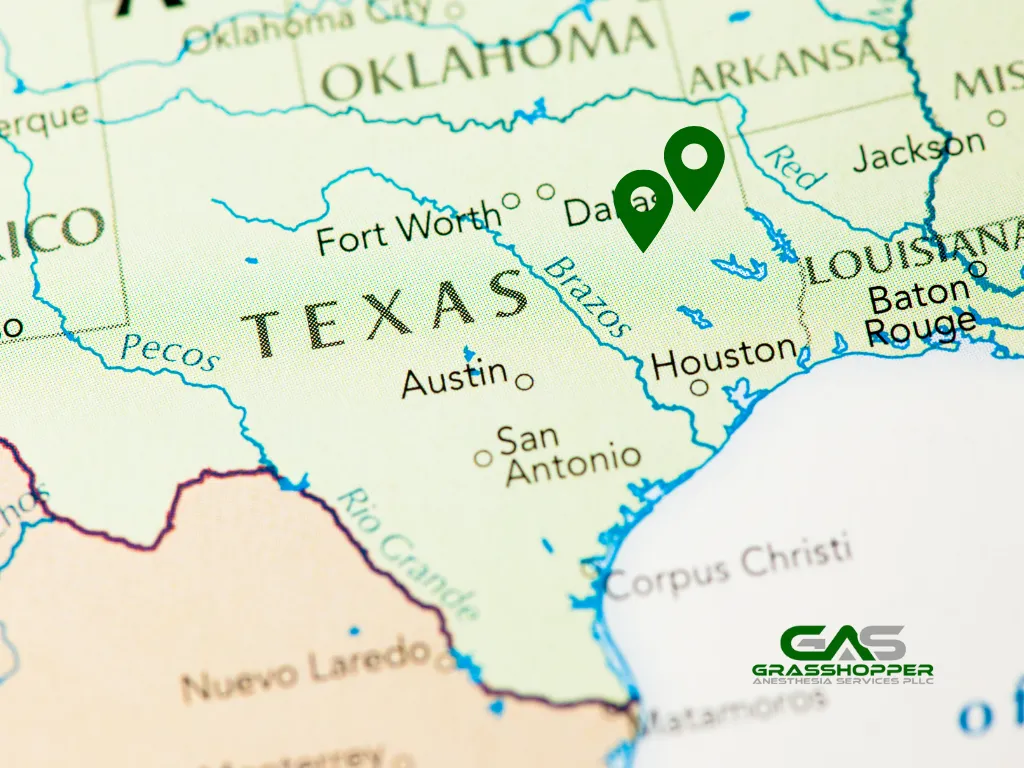by admin
Share
by admin
Share

Certified Registered Nurse Anesthetists (CRNAs) have a big impact in small towns. Doing far more than just filling gaps in healthcare, CRNAs are transforming patient care, especially in rural communities where access to anesthesiologists can be limited. These settings offer unique rewards both professionally and personally. Here’s why rural practices aren’t just a fallback, but a fast-track to meaningful and dynamic careers in anesthesia, and how Grasshopper Anesthesia helps CRNAs step confidently into these essential roles.
Rural Anesthesia Placements: Offering More Than You Might Think
Rural areas face persistent healthcare provider shortages, and CRNAs are uniquely positioned to bridge those gaps. But the impact goes both ways: these communities benefit from high-quality care and offerings, while CRNAs reap a level of professional growth and satisfaction that can be hard to find elsewhere.
Greater Autonomy in Practice
In many rural settings, CRNAs serve as the primary anesthesia providers. This allows for a higher level of clinical independence than what’s often available in larger systems. CRNAs in rural hospitals will be trusted to lead, think critically, and make decisions that directly affect patient outcomes. This provides an incredible opportunity for CRNAs looking to grow in confidence and leadership.
Diverse Case Experience
Rural hospitals might not see the volume of major urban medical centers, but they more than make up for it in variety. From obstetrics to orthopedics and emergency trauma care, CRNAs in rural placements see a wide range of cases; sometimes within the same day. This diversity sharpens skills quickly and keeps work both challenging and rewarding. For newer CRNAs looking to broaden their clinical expertise, rural practice helps build a robust and well-rounded skillset.
Close-Knit Medical Teams
In smaller facilities, you aren’t just a name on a schedule, but part of a team. CRNAs working in rural hospitals often collaborate closely with surgeons, nurses, and administrators in a way that fosters tight-knit camaraderie. Communication pathways are shorter and clearer, and your contributions are more visible. This team-oriented atmosphere often leads to a more satisfying work environment.
Meaningful Patient Relationships
Patients in rural areas are often deeply rooted in their communities, and healthcare providers become a familiar and trusted part of their lives. CRNAs in these roles are often able to build not just satisfaction among their patients, but actual relationships. There’s a real human connection when you see the same faces at the grocery store that you saw in the OR. That sense of purpose and impact runs deep and is nearly impossible to replicate in large cities.
A Lifestyle That Offers Balance
While rural settings can vary, many offer a slower pace of life, lower cost of living, and less traffic and noise. All of these contribute to a better work-life balance, which is crucial for healthcare providers like CRNAs. Whether it’s more time outdoors, shorter commutes, or more affordable housing, rural life has its own kind of luxury in the form of time and space to breathe.
Grasshopper Anesthesia: Supporting CRNAs Where They’re Needed Most
At Grasshopper Anesthesia, we understand the power of rural placements. We specialize in connecting experienced CRNAs with independent roles that promote better patient care and outcomes while being mindful of your personal goals. We’ll match you with available positions that align with your skills and career goals while offering competitive pay and flexible schedules. Ready to make a big impact in a small town? Contact us to find a meaningful workplace where your presence truly matters.
While rural hospitals are the backbone of healthcare access for countless Americans, these facilities continue to face a persistent and complex challenge: maintaining reliable anesthesia coverage. From staffing shortages to fluctuating surgical volumes and even limited recruitment avenues, rural facilities struggle to deliver consistent, high-quality care. Gaps in anesthesia coverage lead to a host of
Finding the right balance between personal and professional life can be challenging, especially for anesthesia providers. In today’s fast-paced healthcare climate, the demand for reliable professionals is growing faster than ever. At Grasshopper Anesthesia Services, our goal is to bridge the gap between work and life. We are committed to providing flexible placement opportunities that
Access to quality healthcare can look very different depending on where you live. While urban areas often have large hospitals and specialized providers nearby, many rural communities struggle with limited resources and long travel times for care. Grasshopper Anesthesia CRNAs transform communities by bridging the divide between quality healthcare and rural areas from Gonzales to
Not all CRNA jobs are created equal. The right opportunity isn’t just about location or pay, it’s about aligning your skills, lifestyle, and career goals so you can thrive in the long run. Going above and beyond just filling positions, Grasshopper Anesthesia matches CRNAs with the roles that fit them best. Learn about our process




